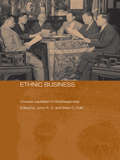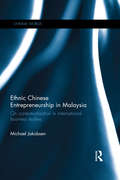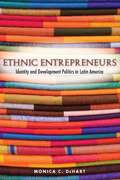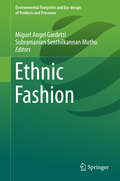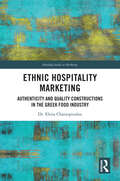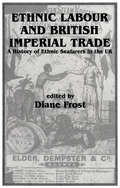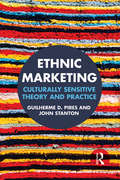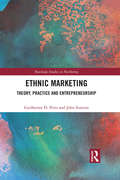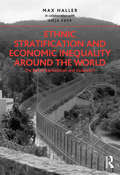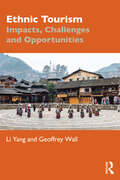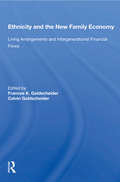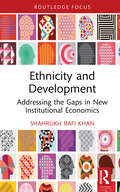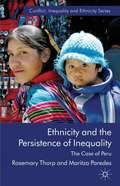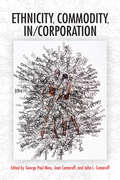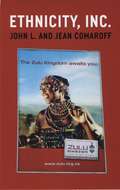- Table View
- List View
Ethische Führung in Organisationen: Konzepte und Umsetzung
by Bernhard BachmannDieses Buch verknüpft die Theorie der ethischen Führung mit der Umsetzung verbesserter Führungspraktiken, insbesondere in hochgradig operativen Umgebungen. Es baut auf der Erkenntnis auf, dass schlechte Formen der Führung zu sinkender Motivation und folglich zu einem schlechten Arbeitsklima und zu Problemen bei der Arbeitsqualität in Organisationen sowie der Gesundheit der Mitarbeiter führen. Sie basiert auf einer qualitativen Studie mit 100 Tiefeninterviews, bei der eine induktive Kategorisierung verwendet wurde, um tiefgehende, reichhaltige und unaufgeforderte Daten aus einem hochentwickelten und fortschrittlichen Produktionsbetrieb zu erhalten.Das Buch gibt einen Überblick über den aktuellen Stand der Forschung auf diesem Gebiet und beschreibt den Aufbau der zugrunde liegenden Studie, die mit den beruflichen Erfahrungen des Autors verknüpft ist. Es erörtert das Forschungsdesign, seine Erprobung und seine Anpassung an die organisatorische Praxis. Das Buch stellt die Ergebnisse der Studie vor, führt in spezifische Fragestellungen ein, die sich aus der Analyse ergeben, diskutiert dann kritisch die Interpretation der Ergebnisse und gleicht diese mit theoretischen Konzepten ab. Ein Ergebnis der Studie ist, dass CSR und Ethik zu oft mit dem Schwerpunkt auf Governance, Verfahren und Berichterstattung umgesetzt werden, ohne die Führung auf allen Ebenen als entscheidende Komponente zu betrachten. Abschließend werden die aus den Ergebnissen abgeleiteten Schlussfolgerungen und Implikationen erörtert. Insgesamt wird in dem Buch kritisch bewertet, wie ethische Führung in Unternehmen praktisch umgesetzt werden kann, um Organisationen in besser geführte Institutionen zu verwandeln, die ethisches Verhalten an den Tag legen. Vorwort von Prof. Dr. James F. O'Kane, Dekan der Business School, Edinburgh Napier UniversityDieses Buch ist eine Übersetzung einer englischen Originalausgabe. Die Übersetzung wurde mit Hilfe von künstlicher Intelligenz (maschinelle Übersetzung durch den Dienst DeepL.com) erstellt. Eine anschließende menschliche Überarbeitung erfolgte in erster Linie in Bezug auf den Inhalt, so dass sich das Buch stilistisch anders liest als eine herkömmliche Übersetzung.
Ethische Führung und Integrität des Mitarbeiters: Untersuchung der Korrelationen zur Einstellung gegenüber Korruption (Business, Economics, and Law)
by Alwina NeumannCompliance-Management sowie präventive Lösungen gegen Unternehmenskriminalität sind aufgrund der aktuellen Gesetzesentwicklungen unumgänglich und heben die Bedeutung und Notwendigkeit einer gelebten Compliance-Kultur hervor. Alwina Neumann rückt im dem Zusammenhang Führungskräfte und ihre Verantwortung zur Förderung einer gelebten Compliance-Kultur in den Mittelpunkt und zeigt damit eine zusätzliche Stellschraube für insbesondere Korruptionsprävention auf. Mittels einer Querschnittsstudie mit Mitarbeitern in Deutschland werden korrelative Zusammenhänge zwischen ethischer Führung sowie Integrität und der Einstellung der Mitarbeiter gegenüber Korruption untersucht und Empfehlungen für die Praxis abgeleitet.
Ethisches Theater: Grundlagen des ethischen Managements und der strukturellen Transformation des Theaters
by Thomas SchmidtMit dem Konzept des Ethischen Theaters wird ein ganzheitliches Zukunftsmodell vorgestellt. Ausgangspunkt ist die Analyse der gegenwärtigen Krisen und der Komplexität in den deutschsprachigen Theatern, um die Grundlagen für ihren Transformationsprozess zu entwickeln. Mit dem Ethischen Theater wird ein Ziel dieses Prozesses vorgestellt: das ganzheitliches Zukunftsmodell einer Theater-Organisation des 21. Jahrhunderts, in der ethische Überlegungen erstmals in allen Prozessen handlungsleitend sind. Das Modell ist kompatibel mit den Interessen der Stakeholder und den wichtigen Reformprozessen, es ermöglicht die anstehende strukturelle Modernisierung der Theaterbetriebe. Unterstützt wird es durch das Konzept des Ethischen Theatermanagements, das erstmals über die klassischen Funktionen hinaus auch Aspekte der Diversität, der Nachhaltigkeit, der Ethik und der Zukunftsfähigkeit adressiert. Mit den erweiterten Funktionen des ethischen Managements werden auch weitere Möglichkeitsräume für die Zukunft der Kultur-Organisationen eröffnet.
Ethnic America: A History
by Thomas SowellThis classic work by the distinguished economist traces the history of nine American ethnic groups--the Irish, Germans, Jews, Italians, Chinese, African-Americans, Puerto Ricans, and Mexicans.
Ethnic Business: Chinese Capitalism in Southeast Asia (Routledge Studies in the Growth Economies of Asia #Vol. 49)
by K. S. Jomo Brian C. FolkThe role of ethnic Chinese business in Southeast Asia in catalyzing economic development has been hotly debated - and often misunderstood - throughout cycles of boom and bust.This book critically examines some of the key features attributed to Chinese business: business-government relations, the family firm, trust and networks, and supposed 'Asian' values. The in-depth case studies that feature in the book reveal considerable diversity among these firms and the economic and political networks in which they manoeuvre.With contributions from leading scholars and under the impressive editorship of Jomo and Folk, Ethnic Business is a well-written, important contribution to not only students of Asian business and economics, but also professionals with an interest in those areas.
Ethnic Chinese Entrepreneurship in Malaysia: On Contextualisation in International Business Studies (Chinese Worlds)
by Michael JakobsenThe study of ethnic Chinese in Southeast Asia has a long tradition. What is most striking in these studies is just how difficult it is to generalise about this ethnic group in the region. Whether or not they have been able to identify as Chinese has to a certain extend depended on different processes of social and political engineering, which in turn make them more or less distinct as an ethnic group. In the case of Malaysia, national political schemes such as the affirmative action policy indirectly force the Malaysian ethnic Chinese to conceive of themselves as a coherent collective, and yet, when asked Chinese entrepreneurs in the maintain that despite the affirmative action policy ethnicity is not the a defining deciding factor when it comes to identifying business partners. This book focuses on the consequences of these kinds of policies in the field of inter-ethnic business practices and entrepreneurship in Malaysia within the wider context of the relationship between local, national and global markets. It focuses on the complexities of inter-ethnic relations and in particular, the strong economic position of the ethnic Chinese and their impact on the Malaysian economic scene as well as on the wider Southeast Asian region, underlining the degree to which inter-ethnic relations in Southeast Asia are crucial to understanding the political and economic complexitiescharacteristic of characterizing the region. In turn, it takes small and medium-sized enterprises as case studies, and shows how they are being shaped and in return shape the society in which they constitute a part. In doing so, the book highlights how these companies not only relate to the domestic economy, but also cater to the global economy, and presents a compelling argument for the introduction of a glocalised perspective in international business studies. Ethnic Chinese Entrepreneurship in Malaysia will be welcomed by students and scholars with an interest in Asian studies, political economy, international business studies, inter-ethnic relations and diaspora studies.
Ethnic Diversity and Economic Instability in Africa
by Hiroyuki Hino John Lonsdale Gustav Ranis Frances StewartThere is growing consensus in the development economics literature that ethnic diversity is a very significant factor in explaining Africa's poor economic performance. Ethnic Diversity and Economic Instability in Africa challenges this conventional wisdom. Drawing on the insights of historians, anthropologists and political scientists as well as development economists, this book questions whether ethnicity is the most useful organising principle by which to examine the economic development of Africa, arguing that it is a more fluid and contingent concept than economic models allow. Instead, the authors explore the actual experience of ethnicity in Africa and propose new methods of measuring ethnic diversity and inequalities. Finally some tentative conclusions are reached regarding appropriate policy reforms.
Ethnic Entrepreneurs: Identity and Development Politics in Latin America
by Monica DehartIn order to understand the emergence and effects of ethnic entrepreneurs, DeHart (anthropology, U. of Puget Sound) traces the changing contours of development practice in Latin America, emphasizing how it has put ethnic cultural difference to work for development. She asks why and in what circumstances ethnic subjects have been identified as agents of economic development; and how the mobilization of ethnic cultural identity and practice for development solidifies, challenges, or transforms how ethnic agents perceive their own identity, community, and development goals. Annotation ©2010 Book News, Inc. , Portland, OR (booknews. com)
Ethnic Fashion
by Subramanian Senthilkannan Muthu Miguel Angel GardettiThis is the first book to introduce readers to the crux of ethnic fashion. Covering all aspects, it addresses the significance of sustainability (including culture) and ethnic fashion in the apparel industry. It also highlights concepts and case studies pertaining to ethnic fashion.
Ethnic Fermented Foods and Alcoholic Beverages of Asia
by Jyoti Prakash TamangAsiahas a long history of preparation and consumption of various types of ethnic fermentedfoods and alcoholic beverages based on available raw substrates of plant oranimal sources and also depending on agro-climatic conditions of the regions. Diversity offunctional microorganisms in Asian ethnic fermented foods and alcoholic beveragesconsists of bacteria (Lactic acid bacteria and Bacillus species, micrococcii, etc. ), amylolytic and alcohol-producingyeasts and filamentous moulds. Though there are hundreds of research articles, reviewpapers, and limited books on fermented foods and beverages, the present book: Ethnic Fermented Foods and Alcoholic Beverages of Asia is the firstof this kind on compilation of various ethnic fermented foods and alcoholic beveragesof Asia. This book has fifteen chapters covering different types of ethnic fermentedfoods and alcoholic beverages of Asia. Some of the authors are well-known scientistsand researchers with vast experiences in the field of fermented foods andbeverages who include Prof. Tek Chand Bhalla, Dr. Namrata Thapa (India),Prof. Yearul Kabir and Dr. MahmudHossain (Bangladesh), Prof. Tika Karki (Nepal), Dr. Saeed Akhtar (Pakistan),Prof. Sagarika Ekanayake (Sri Lanka), Dr. Werasit Sanpamongkolchai (Thailand), Prof. Sh. Demberel (Mongolia), Dr. Yoshiaki Kitamura, Dr. Ken-IchiKusumoto, Dr. Yukio Magariyama, Dr. Tetsuya Oguma, Dr. Toshiro Nagai, Dr. Soichi Furukawa, Dr. Chise Suzuki, Dr. Masataka Satomi, Dr. Kazunori Takamine,Dr. Naonori Tamaki and Dr. Sota Yamamoto (Japan), Prof. Dong-Hwa Shin, Prof. Cherl-Ho Lee, Dr. Young-Myoung Kim, Dr. Wan-Soo Park Dr. Jae-Ho Kim (South Korea) Dr. Maryam Tajabadi Ebrahimi (Iran), Dr. Francisco B. Elegado (Philippines), Prof. Ingrid Suryanti Surono (Indonesia), Dr. Vu Nguyen Thanh (Vietnam). Researchers, students, teachers, nutritionists,dieticians, food entrepreneurs, agriculturalist, government policy makers,ethnologists, sociologists and electronic media persons may read this book whokeep interest on biological importance of Asian fermented foods and beverages.
Ethnic Hospitality Marketing: Authenticity and Quality Constructions in the Greek Food Industry (Routledge Studies in Marketing)
by Elena ChatzopoulouEthnic-themed restaurants are informal but powerful ambassadors for a country’s culture and contributors to local and national economies. Communicating authenticity and quality are essential characteristics in the development of a competitive and effective marketing strategy for restaurants. This book analyses how authenticity and quality perceptions are both constructed and communicated within the ethnic dining sector. Drawing on qualitative research methods, the book explores examples from the Greek food industry to analyse restaurateurs’ and consumers’ constructed meanings of authenticity, and how it is transmitted and received. It follows by exploring the marketing implications of consumer constructs and effective promotional methods to aid restaurateurs to better engage with customers whilst also respecting their culinary culture. It also guides the reader through the use of NVivo for research purposes, and its utilisations to facilitate inductive and interpretive analyses. This book offers a valuable resource for researchers across marketing, including consumer behaviour, food marketing, marketing research and communications. The data analysis tools explored are also transferable to a wide range of sectors outside of food and dining.
Ethnic Labour and British Imperial Trade: A History of Ethnic Seafarers in the UK
by Diane FrostThis collection of essays identifies a neglected but significant component of Britain's maritime and labour history, that of ethnic labour drawn from Britain's colonies in West Africa, the Middle East and Asia. The interdisciplinary nature of the volume raises a number of important issues: race and ethnicity, colonialism and migration, social class and the complex nature of racial hostility meted out by organized white labour.
Ethnic Marketing: Culturally sensitive theory and practice (Routledge Studies In Marketing Ser.)
by John Stanton Guilherme PiresA globalization process epitomised by historically large cross-border population movements with rapidly improving networking and communication technologies, has resulted in the growth of ethnic diversity across newly industrialised economies. Instead of adapting to a dominant, host country culture, many ethnic minorities seek to preserve their identities, both as diasporic communities and within their adopted countries. For marketers it has been recognised as crucial to understand the unique needs of these individuals and to develop superior marketing strategies that meet their preferences. Ethnic Marketing shows the rich opportunities that ethnic minority communities have to offer, as well as offering instruction on the design and implementation of effective social and business marketing strategies. The text offers practical guidance on assessing the needs of individual ethnic communities and a guide to marketing to these communities within various countries. Since the publication of Pires' and Stanton's 2005 book there has been continuing changes in the political, social and economic environment in many countries which have growing ethnic minorities. Incorporating new research across disciplines on the marketing relevance of ethnic minorities, this book also integrates contributions and excerpts from in-depth interviews conducted with leading marketing experts, whose views and insights stimulate discussion and result in in an invaluable guide to best practice in ethnic marketing across the world, plus expert insights into the future of this dynamic area. This is an excellent resource for researchers and advanced marketing students taking both postgraduate and undergraduate courses in marketing management or strategy, as well as government, marketing practitioners and businesses seeking ways to reach ethnic communities.
Ethnic Marketing: Theory, Practice and Entrepreneurship (Routledge Studies in Marketing)
by John Stanton Guilherme D. PiresTogether with the development of transformative technologies that epitomize globalization, the ongoing movements of people across borders and other socio-economic pressures are creating a fast-changing business environment that is difficult for business to understand, let alone control. Dominant social expectations that immigrants should seek to adopt an assimilationist socialization path towards the host country’s mainstream are contradicted by minority ethnic group resilience. There is no evidence that these groups naturally disappear within the cultural and behavioural contexts of their adopted countries. Since ethnic minority consumers cannot be expected to assimilate, then they maintain some significant degree of unique ethnicity related consumer characteristics that convert into threats and opportunities for business. The inherent socialisation process also provides opportunities for ethnic entrepreneurship and for proliferation of ethnic minority business. Following from the extensive examination of scholarly perspectives of ethnic marketing theory, there is an acknowledged and marked divide between theoretical exhortations and what is done in practice, a relative oversight of the implications of mixed embedded markets, and a propinquity to overlook the crucial role played by ethnic entrepreneurship and ethnic networks. Opportunity valuations are difficult to enact due to a lack of intelligence about ethnic markets. Variable sentiment about the future of ethnic marketing links to different predictions on how the drivers of globalization will impact on the acculturation paths of ethnic minorities. Keeping a focus on the ethnic group as the unit of analysis, combining ethnic marketing and ethnic entrepreneurship theories provides intelligence about contemporary ethnic marketing and practice perspectives. The ultimate objective is to reduce the theory-practice divide through the development of a collaborative framework between business and scholars that converts into theory-in-use.
Ethnic Stratification and Economic Inequality around the World: The End of Exploitation and Exclusion?
by Max Haller collaboration Anja EderThe modern world is characterised by pervasive economic inequalities. Strong economic growth in some developing countries has contributed to a degree to a reduction in the levels of inequality between nations, yet inequality within nations remains high and in some cases, continues to increase. Ethnic Stratification and Economic Inequality around the World investigates the reasons for these striking differences, exploring the coincidence and interaction between economic stratification and ethnic differentiation. Drawing on extensive international survey and statistical data, the author develops a new theory and concrete hypotheses concerning the conditions which lead toward extreme inequality and those which tend toward greater equality. A systematic examination of the interaction between class structures, social stratification and ethnic differentiation, this book sheds light on the manner in which the resulting social structures produce different levels of economic inequality, offering a fivefold typology of patterns of ethnic stratification, which can be applied to present-day world regions. Drawing on the work of Max Weber to provide a rigorous investigation of inequality around the world, it demonstrates what 'sociology as a science of social reality' can significantly contribute to our understanding of global economic stratification. The book is relevant for a wide social-scientific audience, particularly for sociologists, economists and political scientists working in a comparative perspective.
Ethnic Stratification and Structural Pluralism in Guyana
by Duane EdwardsThrough a case study of Guyana, a society in which structural pluralism and ethnic/racial divisions coincide to a large extent, this book explores the specific way in which social structures interact with and affect social institutions, ethnic stratification, social actions, and both group-based and purportedly universalist ideologies. The book examines how a system of differentiation and stratification, inherited from colonial times, persists in its essential form in the current time despite attempts to dislodge it. While not falling prey to a structural determinism, the book argues, based on the evidence provided through both a historical sociological review of historical evidence and a presentist analysis of cross-sectional data on business ownership, that actions which coincide with the logic of social structures tend to prevail over actions which take that logic for granted. It is for this reason that political and social players with grand ideals have been less successful in their attempts to bridge the social and economic divides in the country, than those players whose interests coincided with the structural divides.
Ethnic Tourism: Impacts, Challenges and Opportunities
by Geoffrey Wall Li YangThe book explores emerging themes, concepts, and issues in ethnic tourism, through examination of theoretical underpinnings and empirical research in various ethnic destinations worldwide. It encapsulates cultural, environmental, and economic dimensions of ethnic tourism, which is a force of change in many ethnic communities and suggests means through which local benefits can be enhanced and costs reduced. This book presents a range of case studies from diverse well-known ethnic destinations which reveal the various outcomes and changes engendered by ethnic tourism, such as the commodification of ethnic culture, the exploitation of minority peoples by outsiders, and the impact of wider forces of modernization and national integration policies. It summarizes what has been done so far and suggests initiatives to increase the contribution of tourism to the economic development and quality of life of ethnic communities. It brings together a diversity of perspectives that are not currently readily available in one location. The book will appeal to students, and scholars interested in social sciences, tourism studies, geography, anthropology, sociology and economics, as well as in applied disciplines such as planning. It addresses academic and professional audiences that are interested in tourism and its consequences, as well as those who are interested in ethnic, including indigenous peoples, and their circumstances.
Ethnic and Minority Cultures as Tourist Attractions
by Anya Diekmann Melanie Kay SmithThis book focuses on ethnic and minority communities in urban contexts and the ways in which their cultures are represented in tourism development. It offers a multi-disciplinary approach which draws on examples and case studies of ethnic and minority communities and cultural tourism development from all around the world, including slums in India, favelas in Brazil, Chinatowns in Australia, Jewish quarters in Central and Eastern Europe, ethnic villages in China, the African district of Brussels, the gay quarter in Cape Town and a desert town in Israel. It offers a positive perspective on ethnic and minority cultures and communities at a time when social and political support is lacking in many countries. This book will be a useful resource for those studying and researching cultural and urban tourism, urban planning and development, community studies and urban and cultural geography.
Ethnicity And The New Family Economy: Living Arrangements And Intergenerational Financial Flows
by Calvin Goldscheider Frances K. GoldscheiderThis book focuses on the way the family economy is being shaped both by changes in living arrangements and in intergenerational financial flows. It addresses issues of variations in the processes in the United States, particularly differences among ethnic, racial, and religious communities.
Ethnicity and Development: Addressing the Gaps in New Institutional Economics (Routledge Studies in the Growth Economies of Asia #154)
by Shahrukh Rafi KhanEthnicity and Development explores the impact of ethnic fragmentation on the success or failure of nations and uses case studies of Bangladesh and Pakistan to illustrate this. It analyzes the role of institutions in engendering economic and social progress and challenges the New Institutional Economics (NIE) narrative. The book argues that the NIE narrative has some gaps, particularly that it is blind to ethnic fragmentation and therefore does not account for the construction of institutions that can build national cohesion in low- and low-middleincome countries (L/LMICs). It shows that L/LMICs have a different cultural context and that they need to first build national cohesion on a foundation of horizontal – across ethnic groups – and vertical – across classes – equity. The author’s analysis also examines other novel issues, such as the boost that is provided by nations acquiring the right of self-determination. Other novelties are the distinction between prime causes (triggers) for economic development and approaches for economic development. More important for this book is the distinction between natural and constructed nations and the conceptual framework presented to analyze their performance. Finally, the study examines the creation of national cohesion in ethnically diverse nations. Addressing a gap in the literature, this book will be of interest to researchers in development economics, political science and sociology and specialists in comparative politics/political theory with a focus on Area Studies.
Ethnicity and the Persistence of Inequality
by Rosemary Thorp Maritza ParedesUnderstanding why inequality is so great and has persevered for centuries in a number of Latin American countries requires tools that go beyond economics. Investigating the case of Peru, this book explores how inequality is embedded in institutions that constitute the interface between the economy, the polity and geography of the country.
Ethnicity, Commodity, In/Corporation (Framing the Global)
by George Paul Meiu, Jean Comaroff and John L. ComaroffIn the economics of everyday life, even ethnicity has become a potential resource to be tapped, generating new sources of profit and power, new ways of being social, and new visions of the future. Throughout Africa, ethnic corporations have been repurposed to do business in mining or tourism; in the USA, Native American groupings have expanded their involvement in gaming, design, and other industries; and all over the world, the commodification of culture has sown itself deeply into the domains of everything from medicine to fashion. Ethnic groups increasingly seek empowerment by formally incorporating themselves, by deploying their sovereign status for material ends, and by copyrighting their cultural practices as intellectual property. Building on ethnographic case studies from Kenya, Nepal, Peru, Russia, and many other countries, this collection poses the question: Does the turn to the incorporation and commodification of ethnicity really herald a new historical moment in the global politics of identity?
Ethnicity, Inc.
by John L. Comaroff Jean ComaroffIn Ethnicity, Inc. anthropologists John L. and Jean Comaroff analyze a new moment in the history of human identity: its rampant commodification. Through a wide-ranging exploration of the changing relationship between culture and the market, they address a pressing question: Wherein lies the future of ethnicity? Their account begins in South Africa, with the incorporation of an ethno-business in venture capital by a group of traditional African chiefs. But their horizons are global: Native American casinos; Scotland's efforts to brand itself; a Zulu ethno-theme park named Shakaland; a world religion declared to be intellectual property; a chiefdom made into a global business by means of its platinum holdings; San "Bushmen" with patent rights potentially worth millions of dollars; nations acting as commercial enterprises; and the rapid growth of marketing firms that target specific ethnic populations are just some of the diverse examples that fall under the Comaroffs' incisive scrutiny. These phenomena range from the disturbing through the intriguing to the absurd. Through them, the Comaroffs trace the contradictory effects of neoliberalism as it transforms identities and social being across the globe. Ethnicity, Inc. is a penetrating account of the ways in which ethnic populations are remaking themselves in the image of the corporation--while corporations coopt ethnic practices to open up new markets and regimes of consumption. Intellectually rigorous but leavened with wit, this is a powerful, highly original portrayal of a new world being born in a tectonic collision of culture, capitalism, and identity.





